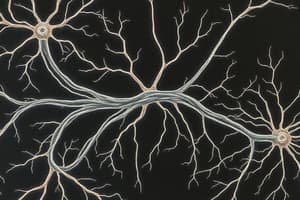Podcast
Questions and Answers
Which part of the brain mediates information transmission between the brain and body below the neck?
Which part of the brain mediates information transmission between the brain and body below the neck?
- The cerebrum (correct)
- The thalamus
- The cerebellum
- The medulla oblongata
Which system controls involuntary functions such as heart rate and digestion?
Which system controls involuntary functions such as heart rate and digestion?
- The peripheral nervous system
- The enteric nervous system
- The somatic nervous system
- The autonomic nervous system (correct)
Which subdivision of the autonomic nervous system is responsible for the fight or flight response?
Which subdivision of the autonomic nervous system is responsible for the fight or flight response?
- The somatic nervous system
- The parasympathetic nervous system
- The enteric nervous system
- The sympathetic nervous system (correct)
What is the function of the spinal cord?
What is the function of the spinal cord?
How many pairs of spinal nerves are there in the peripheral nervous system?
How many pairs of spinal nerves are there in the peripheral nervous system?
What is the function of the enteric nervous system?
What is the function of the enteric nervous system?
Which part of the nervous system connects the CNS to limbs and organs via cranial and spinal nerves?
Which part of the nervous system connects the CNS to limbs and organs via cranial and spinal nerves?
Flashcards are hidden until you start studying
Study Notes
Mechanics of the Nervous System
- The nervous system is a network of neurons in the brain, spinal cord, and periphery.
- The central nervous system (CNS) includes the brain and spinal cord, while the peripheral nervous system (PNS) consists of nerves and ganglia.
- The cerebrum is a part of the brain that mediates information transmission between the brain and body below the neck, while the spinal cord coordinates certain reflexes and is a conduit for sensory and motor information.
- The spinal cord is protected by vertebrae and has a core of grey matter surrounded by white matter, with dorsal and ventral roots for afferent and efferent neurons.
- The PNS connects the CNS to limbs and organs via cranial and spinal nerves, conveys information from the environment to the CNS through afferent neurons, and transmits messages from the CNS to muscles and glands via efferent neurons.
- The PNS includes 43 pairs of nerves, with 12 cranial nerve pairs and 31 spinal nerve pairs.
- The somatic nervous system controls voluntary body movement, receives sensory information, and controls spinal nerves that innervate skin, joints, and muscles.
- The autonomic nervous system controls involuntary functions and the internal environment, with afferent neurons carrying sensory information and efferent neurons controlling smooth muscle, cardiac muscle, and glands.
- The autonomic nervous system has three further subdivisions: the sympathetic nervous system, the parasympathetic nervous system, and the enteric nervous system.
- The sympathetic nervous system coordinates the fight or flight response, while the parasympathetic nervous system coordinates the rest and relax response.
- The enteric nervous system lines the gastrointestinal tract and controls digestion, including swallowing, enzyme release, and nutrient absorption.
- Understanding the structure and function of the nervous system is important for understanding the mechanics of action potential signal transmission along axons.
Studying That Suits You
Use AI to generate personalized quizzes and flashcards to suit your learning preferences.




